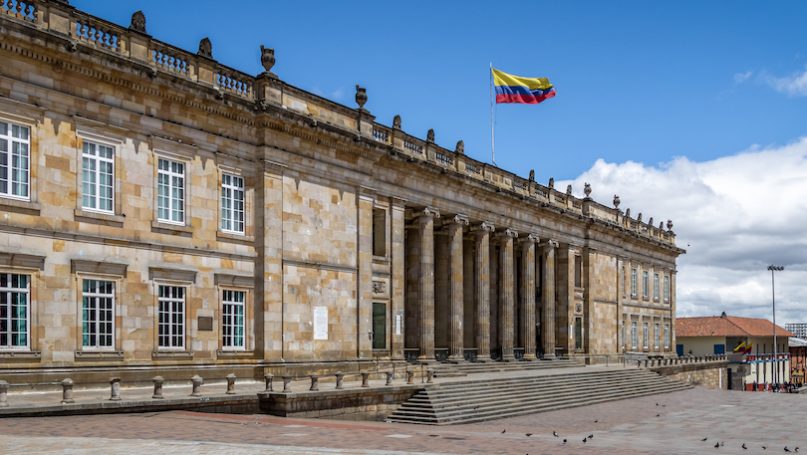
Colombia, Latin America’s third most populous country, votes for a new Congress this weekend. The elections will provide a crucial first indication in which direction the country is heading ahead of the upcoming presidential elections in May and June this year. In Colombia, which many observers consider one of Latin America’s most conservative societies, left-leaning politics never managed to gain much ground.
The latest polls by Guarumo-EcoAnalítica, a local market research firm, predict a highly fragmented result for Sunday’s Congress elections. Each of the five strongest parties in the poll can only expect to gather 10 to 15% of the votes. Obtaining the best result of any leftist party will likely be the Pacto Histórico, a coalition of various left-leaning groups, on place five.
Yet, over the last two years, the consistent front runner of the presidential election polls has been Gustavo Petro of the Pacto Histórico, a former member of the urban revolutionary guerilla group M-19 demobilized in the early 1990s. Mr. Petro later became a senator and mayor of Bogotá, Colombia’s capital, from 2012 to 2015.
The mismatch between the polls of Sunday’s parliamentary elections and the presidential elections later in the year roots back to a profound crisis of trust in Colombia’s political party system. 80% of Colombians don’t identify with and have little faith in any political party. Personality is thus vital, and charismatic characters such as Mr. Petro have space to thrive. Nevertheless, for most observers, it remains astonishing that a candidate from the left, above all a former guerrilla member, may lead Colombian politics. Several developments in Colombia’s recent history enabled Mr. Petro’s rise.
In 2016, Colombia signed a peace deal with the FARC, a guerrilla group which had been fighting a Marxist insurgency against the Colombian army and state-aligned right-wing paramilitaries since the 1960s. During this internal armed conflict, internal security dominated political discussions with little space for socio-economic issues. Leftist politicians and activists were discredited for supposed links to the guerrilla and faced at best stigmatization, at worst death threats and executions.
The peace deal in 2016 and consequent demobilization of large parts of the FARC then allowed political debates to refocus on the many pending social issues within Colombia, second only to Brazil in terms of inequality across Latin America. Consequently, two waves of country-wide mass protests swept the country in 2019 and 2021, demanding, amongst other, wide-reaching social and economic reforms, more rigorous implementation of the 2016 peace deal, and intensified state protection against the killings of social activists. In the climate of national outrage, a Colombian president from the left suddenly seemed not so out of place anymore.
Should Colombia indeed vote for Mr. Petro, the result would confirm recent trends across Latin America. Since 2018, leftist presidential candidates have won elections in Argentina, Bolivia, Chile, Honduras, Mexico, Panama, and Peru. Likewise, current polls for the Brazilian presidential elections in October this year predict a landslide win of Luiz Inácio Lula da Silva, a former president from the Brazilian worker party, over far-right incumbent Jair Bolsonaro.
While the reasons for this almost region-wide political turn are diverse and differ from country to country, a common factor is a stark inequality combined with limited social mobility opportunities. Before the pandemic, sluggish commodity prices haltered growth and tax revenues in the region, with most economies still highly dependent on natural resource exports. Consequent austerity policies with reduced social welfare spending also led to mass strikes and protests (similar to those in Colombia) in Bolivia, Chile, and Ecuador.
The Covid-19 pandemic revealed the limitations of healthcare and welfare systems in the region and further strangled state finances and economic growth with the consequences predominantly born by lower-income classes. Lockdowns led to rising unemployment, especially in low-skill service and informal sector jobs, further increasing poverty and inequality. These trends led to anti-incumbent atmospheres jointly with demands for increased social protection.
Colombia’s Congress elections will provide a meaningful indication of where Colombia positions itself on Latin America’s turn to the left. The likely fragmented outcome will create a challenging task for the next president of building a supporting coalition to push through legislative initiatives. Whoever wins the presidential elections later in the year, Sunday’s results will show the legislative majorities with which to work.
Further Reading on E-International Relations
- #ElParoNoPara: Peace, Protests, and Performances of Solidarity in Colombia
- Colombia’s ‘Total Peace’ and Climate Change
- Opinion – Colombia’s Transitional Justice System Sets Precedent for Accountability
- Opinion – Covid-19 in Colombia: Migration, Armed Conflict and Gendered Violence
- Colombia: Coronavirus in a Scenario of Humanitarian Crisis
- Indigenous Conflict Victims and the Growing Tent City in Bogotá